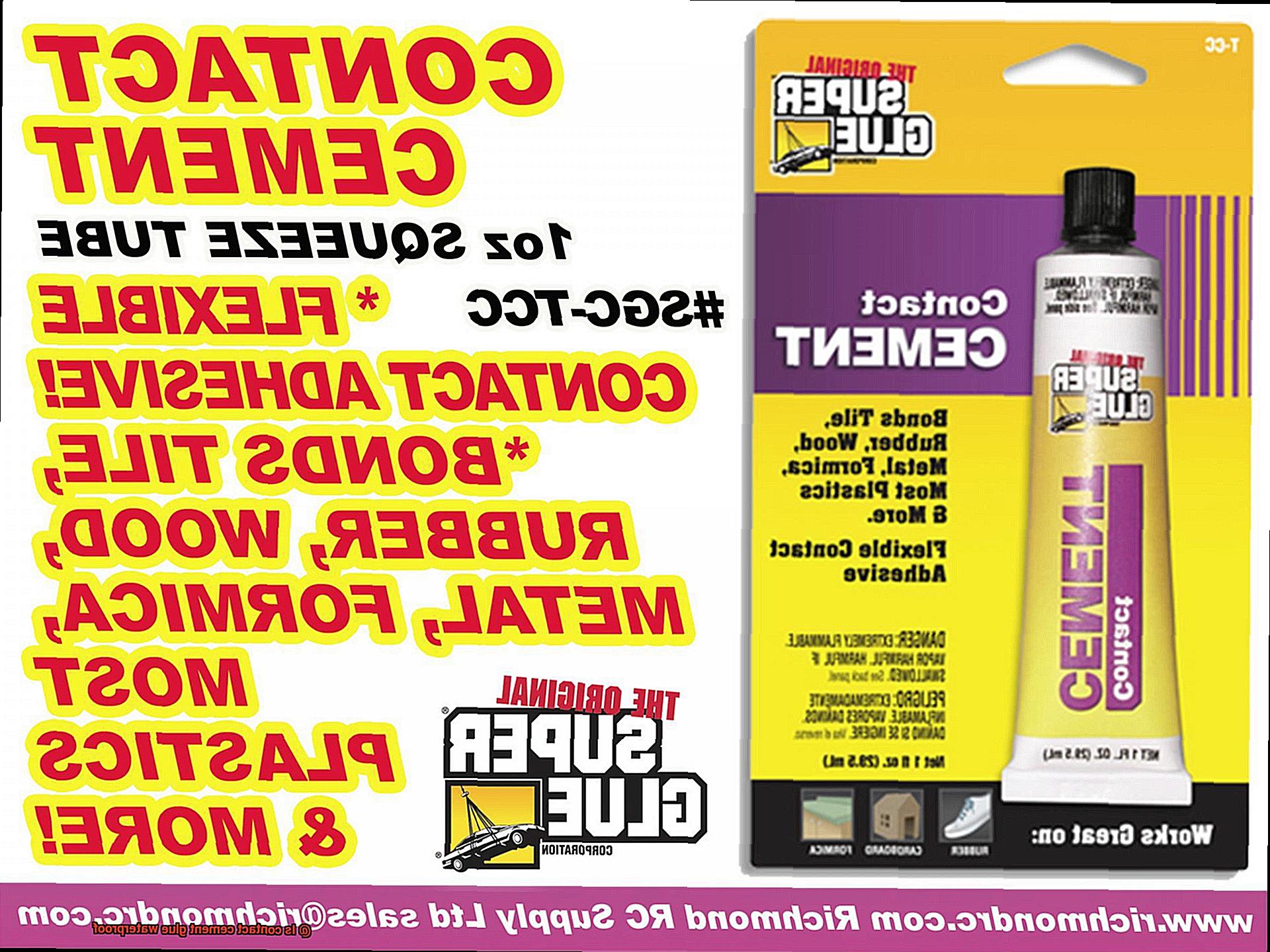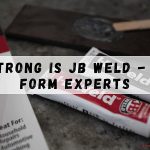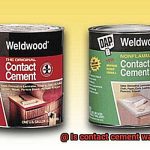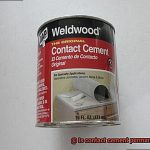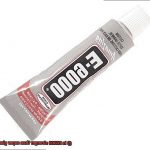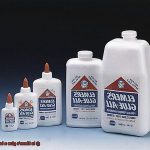Are you curious about whether contact cement glue is waterproof?
Well, wonder no more because we’ve got the answer for you. In this blog post, we’re going to explore the fascinating world of contact cement glue and its waterproof properties.
Get ready to be amazed as we unravel the mysteries behind this adhesive and reveal whether it can stand up to water. Whether you’re a DIY enthusiast or a professional craftsman, get ready to gain some valuable insights into the waterproofness of contact cement glue.
So, let’s dive in and find out if this adhesive can handle the wettest of situations.
What is Contact Cement Glue?
Contents
When it comes to bonding materials together, contact cement glue is a reliable and versatile choice. Whether you’re a DIY enthusiast, a professional woodworker, or a craft enthusiast, contact cement glue offers an instant and strong bond that can withstand various applications. In this article, we will explore the characteristics, applications, and limitations of contact cement glue to help you understand why it is an essential adhesive for many projects.
Instant Bonding:
Contact cement glue is known for its ability to create an instant bond upon contact. Unlike other adhesives that require clamping or pressure to set, contact cement glue bonds immediately. This makes it perfect for projects that require quick and reliable adhesion. No more waiting around for the glue to dry. It’s like a handshake that turns into a tight embrace in seconds.
Versatile Application:
Contact cement glue is available in liquid or gel form, with the liquid form being more common. It can be applied using a brush, roller, spatula, or trowel depending on the consistency. This versatility allows for easy application on various surfaces such as wood, metal, plastic, fabric, leather, rubber, and even some types of glass. It’s like having a superhero adhesive that can bond almost anything together.
Porous and Non-Porous Materials:
One of the unique characteristics of contact cement glue is its ability to bond both porous and non-porous materials. This means it is suitable for bonding a wide range of materials such as laminates, veneers, decorative surfaces in furniture making, shoe repairs, bag repairs, upholstery work, and DIY crafts. Whether you’re repairing a broken chair or creating a beautiful piece of artwork, contact cement glue has got you covered. It’s like having a chameleon-like adhesive that adapts to any surface.
Limitations:
While contact cement glue offers many benefits, it’s important to consider its limitations. Firstly, it is not suitable for applications that require resistance to extreme temperatures or exposure to water. Contact cement glue is not waterproof and can weaken or break down when exposed to moisture. Therefore, it is best used for indoor projects or applications that are not constantly exposed to water. If you need a waterproof bond, it’s advisable to explore alternative adhesives specifically designed for outdoor or wet conditions. Like any superhero, contact cement glue has its kryptonite.
Properties of Contact Cement Glue

Contact cement glue is a remarkable adhesive with a multitude of impressive properties. Its high initial strength, excellent bonding capabilities, resistance to heat and chemicals, and even its limitations regarding water resistance make it a go-to choice for various applications.
One of the standout properties of contact cement glue is its high initial strength. When applied correctly, it creates an instant bond between two surfaces, allowing for immediate use or handling. This feature is particularly useful in time-sensitive projects where waiting for the adhesive to dry is simply not an option.
Furthermore, contact cement glue exhibits excellent bonding capabilities on a wide range of materials including wood, metal, plastic, laminate, and leather. It forms a strong and durable bond that can withstand heavy loads and stress. Whether you’re building furniture, crafting masterpieces, or fixing things around the house, contact cement glue has got your back.
Additionally, contact cement glue is known for its resistance to heat and chemicals. It can withstand high temperatures without losing its adhesive properties or melting. This makes it suitable for applications where heat resistance is required. Moreover, it remains unaffected by exposure to common household chemicals such as cleaners or oils, ensuring that the bond remains intact even in harsh environments.
However, when it comes to water resistance, contact cement glue has some limitations. It is not completely waterproof and can be affected by prolonged exposure to water or moisture. The adhesive bond may weaken or break down if subjected to excessive moisture. Despite this weakness, the glue can still withstand occasional contact with water or brief exposure to moisture without significant damage.
For projects that require water resistance, specialized formulations labeled as “water-resistant” or “waterproof” are available from some manufacturers. These formulas contain additives that enhance the glue’s ability to withstand water and moisture. Proper surface preparation is key to ensuring the best water resistance possible. Thoroughly cleaning and drying the surfaces before applying the glue will help maximize its effectiveness.
Is Contact Cement Glue Waterproof?
Let’s Dive into the Details.
Imagine this: you’re knee-deep in a project that demands an adhesive with unwavering strength, capable of withstanding all sorts of environmental challenges, including water. You’ve heard rumblings about contact cement glue and its remarkable bonding capabilities, but the burning question remains: is it waterproof? Well, let’s dive into the depths of this inquiry and unearth the truth.
Contact cement glue, a versatile adhesive widely used in woodworking, construction, and crafting, boasts a rapid drying time and exceptional bonding strength. However, when it comes to water resistance, we must scrutinize the glue’s very composition.
Typically comprised of solvents, rubber polymers, and resins, contact cement glue isn’t inherently waterproof. Yet fear not. It does possess some water-resistant properties. As the solvents evaporate during the drying process, the rubber polymers and resins harden to form an enduring bond that repels moisture.
Nevertheless, it is important to acknowledge that contact cement glue cannot be deemed fully waterproof. Extended exposure to water or moisture can gradually weaken the bond, potentially separating the glued surfaces. Thus, if your project necessitates steadfast waterproofing, it is prudent to opt for a specialized waterproof adhesive instead.
Thankfully, a cornucopia of waterproof glues graces the market, specifically engineered to brave water exposure while maintaining their unparalleled bonding strength. These specialized adhesives often exhibit enhanced water resistance properties compared to contact cement glue.
Should you choose to employ contact cement glue for a project requiring some level of water resistance, fret not. There are measures you can take to bolster its performance. Applying a protective coating or sealant over the glued surfaces can serve as an impenetrable barrier against water intrusion and prolong the life of the bond.
However, it is worth noting that different brands and formulations of contact cement glue may boast varying degrees of water resistance. Consequently, consulting the manufacturer’s instructions or product specifications for specific details regarding water resistance is always sage advice.
Factors That Affect the Waterproofing of Contact Cement Glue
In this enlightening blog post, we will delve into the multifaceted factors that impact the waterproofing of contact cement glue.

Let’s commence our exploration by delving into the composition of the glue. Contact cement glue boasts a captivating blend of solvents, resins, and rubber compounds. The precise formulation and proportions of these ingredients hold the power to determine the glue’s ability to resist water penetration. It is crucial to select a glue that aligns with the desired level of water resistance for your project.
Next, let us venture into the realm of application methods. The manner in which the glue is applied can significantly influence its waterproofing prowess. Ensure a flawless outcome by bestowing upon both surfaces an even layer of adhesive, allowing it to dry until it reaches a tantalizing state of tackiness, and then firmly pressing the surfaces together. Beware any gaps or air bubbles that may emerge as they can serve as gateways for water, jeopardizing the adhesive’s waterproofing capabilities.
Prepare to face yet another crucial facet—surface preparation. The condition of your surfaces plays an integral role in determining the strength of the adhesive bond. Time and effort must be dedicated to achieving clean, dry, and untainted surfaces. Dust particles, grease residue, or even lingering moisture can hinder the glue’s effectiveness and pave the way for water leakage. Meticulous cleaning and preparation are essential prerequisites for successful adhesive application.
Now, let us contemplate the impact of environmental conditions on waterproofing. Temperature and humidity possess an undeniable influence over contact cement glue’s resistance to water. Extreme conditions have been known to compromise certain types of glue, rendering them less effective or more susceptible to water damage. Perusing the manufacturer’s recommendations regarding application temperature and humidity range is an indispensable step toward optimal waterproofing performance.
Of course, we cannot overlook the profound influence of water and moisture exposure. While some contact cement glues valiantly withstand sporadic or fleeting encounters with water, continuous immersion or prolonged exposure may cause them to gradually wither away. Prioritize selecting a glue that aligns with the anticipated level of water exposure for your project.
Lastly, the passage of time and the forces of deterioration can cast a shadow over contact cement glue’s waterproofing properties. Factors such as relentless UV exposure, wayward chemical encounters, unpredictable temperature fluctuations, and even the weight of mechanical stress can all contribute to the adhesive bond’s gradual decay. Maintaining regular vigilance and conducting periodic inspections of glued surfaces are paramount in preserving the adhesive’s unwavering waterproofing effectiveness.
Common Uses for Contact Cement Glue
Whether you’re in construction, automotive, crafting, or just need to fix something around the house, contact cement glue has got you covered. Let’s explore some of the common uses for this amazing adhesive.

In the construction industry, contact cement glue is a go-to choice for bonding laminates, veneers, and decorative materials to surfaces like wood, metal, or plastic. It creates a strong and durable bond that can withstand the wear and tear of everyday use. Whether you’re working on cabinets, countertops, or furniture, contact cement glue ensures a secure and long-lasting result.
Automotive professionals also rely on contact cement glue for their upholstery repair needs. From fixing torn seats to attaching trim and panels, this adhesive provides a reliable solution. It can withstand the vibrations and movement of vehicles, ensuring that your repairs hold up over time.
Crafters and DIY enthusiasts love contact cement glue for its versatility. It’s perfect for bonding foam, fabric, and other porous materials. If you’re working on a project that involves textiles or need to create custom home decor items, contact cement glue will be your new best friend.
But contact cement glue isn’t just limited to construction and crafting. It’s also commonly used in countertop and flooring installations. Its strong bond ensures that your countertops or tiles stay in place, even under heavy use. Additionally, if you need to create gaskets or seals, contact cement glue is perfect for bonding rubber and neoprene materials.
Artists can also get in on the action with contact cement glue. Some artists use it for mixed media artwork or for adhering heavy objects to their pieces. Its reliability allows them to explore new creative possibilities.
Of course, let’s not forget about everyday repairs. From fixing furniture to patching up shoes or bags, contact cement glue is the adhesive of choice. Its strong bond and durability ensure that your repairs stand the test of time.
Protecting the Bond from Moisture
If you’re as passionate about contact cement glue as we are, then you understand the importance of protecting the bond from moisture. A weakened bond can lead to adhesive disasters and heartbreak. But worry not. We’ve got your back with some expert tips on how to keep your bond intact and moisture-free. So grab a cup of coffee and let’s dive in.
Waterproof Sealant or Coating:
Think of this as a superhero shield for your bond. Apply a waterproof sealant or coating over the adhesive to create a protective barrier against moisture. Look for products specifically designed for contact cement glue and follow the manufacturer’s instructions for the best results.
Moisture Barrier:
Don’t let moisture sneak up on your bond. Apply a layer of primer or a specialized moisture-blocking product before applying the glue. This creates a shield between the adhesive and any moisture present in the substrate, ensuring a stronger and longer-lasting bond.
Ventilation and Drainage:
Let your bond breathe. Poorly ventilated areas can trap moisture, leading to potential damage. Improve airflow and ensure adequate drainage in the area where you’re using the glue. This simple step can go a long way in protecting your bond from pesky moisture buildup.
Choose the Right Glue:
Not all glues are created equal when it comes to water resistance. Opt for contact cement glues that are specifically formulated to withstand moisture. These waterproof or water-resistant varieties provide an added layer of protection and peace of mind.
Regular Maintenance and Inspection:
Just like any relationship, your bond needs some TLC. Regularly inspect the bonded surfaces for any signs of water intrusion or deterioration. If you spot any issues, take immediate action to rectify them. This may involve reapplying sealant, repairing damaged areas, or addressing underlying moisture-related problems.
Alternatives to Contact Cement Glue
When it comes to adhesive options, contact cement glue has long been favored for its versatility and strong bond. However, if you’re seeking alternatives that better suit your specific needs or preferences, there are numerous options available. In this article, we will explore some of the best alternatives to contact cement glue, delving into their properties and benefits to help you make an informed decision.
Epoxy Resin:
- Creates a robust and long-lasting bond.
- Boasts exceptional waterproof properties, making it ideal for projects exposed to water or moisture.
- Suitable for various materials, including wood, metal, plastic, and ceramic.
Cyanoacrylate Adhesive (Super Glue):
- Dries quickly and forms an instant bond.
- Highly effective in bonding materials like metal, plastic, and rubber.
- Offers good resistance to water and moisture.
Water-Based Adhesives:
- Eco-friendly option made from natural ingredients.
- Provides a strong bond without harmful chemicals or solvents.
- Suitable for various materials but may have lower water resistance compared to contact cement glue or epoxy resin.
Silicone Adhesive:
- Renowned for its flexibility and ability to bond materials that expand and contract.
- Excellent water resistance, making it suitable for outdoor or wet environments.
- Ideal for applications with movement or vibration, such as plumbing or automotive repairs.
Specialty Adhesives:
- Fabric glue: Specifically designed for bonding fabric materials with good water resistance and washing capabilities.
- Carpenter’s glue/wood glue: Provides a strong and durable bond for woodworking projects.
Conclusion
In conclusion, while contact cement glue is not completely waterproof, it does possess some water-resistant properties. It can handle occasional water contact or brief exposure to moisture without significant damage. However, extended exposure to water or excessive moisture can weaken the bond and potentially separate glued surfaces. So, if you’re looking for a high level of waterproofing, it’s best to explore alternative adhesives designed specifically for outdoor or wet conditions.
But don’t let its lack of complete waterproofing deter you. Contact cement glue offers a plethora of impressive properties that make it a reliable choice for various applications. It provides an instant bond upon contact, making it perfect for projects that demand quick and dependable adhesion. Plus, it’s incredibly versatile and can be used on a wide range of surfaces like wood, metal, plastic, fabric, leather, rubber, and even certain types of glass. Additionally, it bonds both porous and non-porous materials with exceptional resistance to heat and chemicals.
If you need to enhance the water resistance of contact cement glue in your projects, there are steps you can take. Applying a protective coating or sealant over the glued surfaces acts as a barrier against water intrusion and extends the bond’s lifespan. Additionally, opting for brands or formulations labeled as “water-resistant” or “waterproof” may offer better performance in wet conditions.
Ultimately, understanding the properties and limitations of contact cement glue empowers you to make informed decisions about its suitability for your specific project needs.

